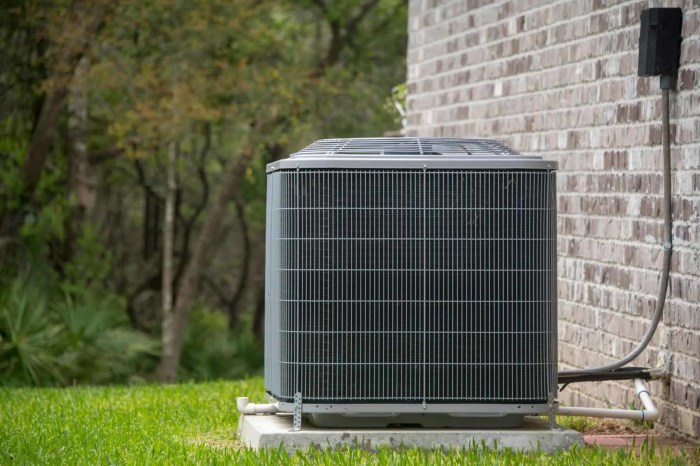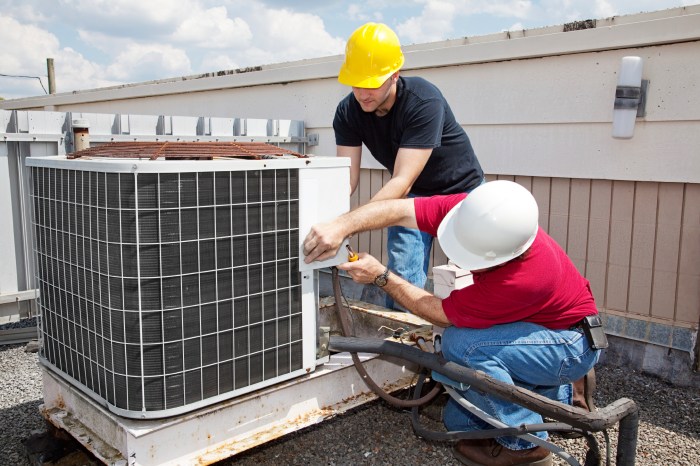Central AC Repair Near Me: Everything You Need to Know
When it comes to central AC repair near me, it's crucial to understand the ins and outs of maintenance and repair. This comprehensive guide will delve into the key aspects of keeping your central AC unit in top shape, from common repair issues to troubleshooting tips and more.
Get ready to elevate your knowledge on central AC repair near me!
In the following sections, we will explore the importance of regular maintenance, common repair issues, DIY troubleshooting tips, choosing a reliable repair service, and the costs associated with central AC repairs. Let's jump in!
Importance of Regular Central AC Maintenance
Regular maintenance of your central AC unit is essential to ensure optimal performance and longevity. By scheduling routine maintenance, you can benefit in the following ways:Regular maintenance helps identify and address minor issues before they escalate into major problems, saving you from costly repairs in the long run.Proper maintenance can improve the efficiency of your central AC unit, leading to lower energy bills and reduced energy consumption.Routine maintenance can extend the lifespan of your central AC unit, allowing you to enjoy its cooling benefits for a longer period.
Frequency of Maintenance
It is recommended to have your central AC unit serviced at least once a year by a professional HVAC technician. However, if you use your AC frequently or live in a particularly hot climate, you may need more frequent maintenance checks, such as every six months.
Regular filter changes and cleaning should also be done every 1-3 months to ensure optimal performance.
Common Central AC Repair Issues
Central AC units can experience various issues that may require repair to ensure efficient cooling. It is essential to be aware of these common problems to address them promptly and prevent further damage to the system.
1. Refrigerant Leaks
Refrigerant leaks are a common issue in central AC systems and can lead to reduced cooling performance. Signs of a refrigerant leak include decreased cooling efficiency, hissing sounds, and ice buildup on the refrigerant lines.
Regular maintenance checks for refrigerant levels can help identify leaks early on.
The potential causes of refrigerant leaks can include corrosion, faulty connections, or manufacturing defects in the system components.
2. Frozen Evaporator Coils
Frozen evaporator coils can prevent the central AC unit from effectively cooling the air. Signs of frozen coils include warm air blowing from the vents and ice buildup on the coils.
Regularly changing air filters and ensuring proper airflow can help prevent frozen evaporator coils.
Potential causes of frozen coils include restricted airflow, low refrigerant levels, or issues with the blower motor.
3. Electrical Malfunctions
Electrical malfunctions, such as faulty wiring or capacitor issues, can disrupt the operation of a central AC system. Symptoms of electrical problems may include frequent tripping of the circuit breaker or the AC unit not turning on.
It is crucial to have a professional technician inspect and repair any electrical issues in the central AC system.
Potential causes of electrical malfunctions can stem from improper installation, wear and tear on electrical components, or power surges.
DIY Central AC Troubleshooting Tips

When facing common central AC issues, there are some troubleshooting tips you can try before calling a professional. However, it's important to follow safety precautions and know when it's best to leave the repairs to the experts.
Low Airflow
If you notice low airflow coming from your vents, check the air filter first. A dirty or clogged filter can restrict airflow. Replace the filter if needed and see if the airflow improves.
Warm Air Coming from Vents
If your central AC is blowing warm air instead of cool air, check the thermostat settings. Make sure it's set to 'cool' and the temperature is lower than the current room temperature. If the issue persists, check for any ice buildup on the evaporator coils.
Strange Noises
If you hear unusual noises coming from your AC unit, such as grinding, squealing, or banging sounds, it could indicate a problem with the motor or other components. Turn off the system and inspect for any visible damage or debris.
If you can't identify the issue, it's best to call a professional.
Leaking Refrigerant
If you suspect a refrigerant leak in your central AC system, look for oily residue around the unit or hissing sounds coming from the refrigerant lines. Refrigerant leaks are best handled by trained technicians due to the potential safety hazards involved.
Choosing a Reliable Central AC Repair Service

When it comes to selecting a central AC repair service, there are several factors to consider to ensure you choose a reliable and trustworthy company. From comparing different types of services available to looking at certifications and qualifications, making an informed decision is crucial for the longevity and efficiency of your central AC system.
Factors to Consider When Selecting a Central AC Repair Service
- Experience: Look for a repair service with a proven track record of successfully repairing central AC systems.
- Reputation: Check online reviews and ask for recommendations from friends or family to gauge the reputation of the repair service.
- Pricing: While cost is important, avoid choosing a repair service solely based on price. Quality of service should be a priority.
- Response Time: A reliable repair service should offer prompt responses and quick turnaround times for repairs.
Compare Different Types of Central AC Repair Services Available
- Authorized Service Centers: These are repair services authorized by the manufacturer, ensuring expertise in handling specific brands.
- Independent Repair Services: These services may offer competitive pricing and personalized attention but may lack manufacturer authorization.
- Emergency Repair Services: Consider services that offer emergency repair options for urgent AC issues that need immediate attention.
Importance of Certifications and Qualifications When Choosing a Repair Service
Certifications and qualifications are crucial indicators of a repair service's expertise and professionalism. Look for technicians who are certified by organizations like NATE (North American Technician Excellence) or have received training from reputable institutions. These certifications ensure that the technicians have the necessary skills and knowledge to effectively diagnose and repair central AC systems.
Cost of Central AC Repairs
When it comes to central AC repairs, the costs can vary depending on the type of repair needed. Understanding the typical costs associated with these repairs and knowing how to budget for them can help you manage your expenses effectively.
Breakdown of Costs
- Parts Replacement: One of the main costs associated with central AC repairs is the replacement of parts such as compressors, capacitors, or fan motors. These parts can range in price depending on the brand and model of your AC unit.
- Labor Costs: Hiring a professional technician to diagnose and repair your central AC system comes with labor costs. The hourly rate can vary depending on the complexity of the repair.
- Refrigerant Refill: If your central AC system is low on refrigerant, it will need to be refilled. The cost of refrigerant can add to the overall repair expenses.
Tips for Budgeting
- Regular Maintenance: Investing in regular maintenance for your central AC system can help prevent costly repairs in the future. By keeping your system in good condition, you can avoid unexpected breakdowns.
- Get Multiple Quotes: When facing a repair issue, it's always a good idea to get multiple quotes from different central AC repair services. This can help you compare prices and choose the most cost-effective option.
- Consider Energy Efficiency: Upgrading to a more energy-efficient central AC system can help reduce your overall repair costs in the long run. Newer models are often more efficient and require fewer repairs.
Final Summary

As we wrap up our discussion on central AC repair near me, remember that staying proactive with maintenance can save you from costly repairs down the line. By following the tips and guidelines Artikeld here, you'll be well-equipped to keep your central AC unit running smoothly.
Here's to a cool and comfortable indoor environment all year round!
FAQ Section
How often should I schedule maintenance for my central AC unit?
It's recommended to have your central AC unit serviced at least once a year to ensure optimal performance and prevent major issues.
What are some common signs that indicate my central AC unit needs repair?
Unusual noises, poor airflow, warm air coming from vents, and frequent cycling on and off are common indicators that your AC unit may require repairs.
Is DIY troubleshooting recommended for central AC issues?
While some minor troubleshooting can be done DIY, it's best to leave complex repairs to professionals to avoid causing further damage to your system.